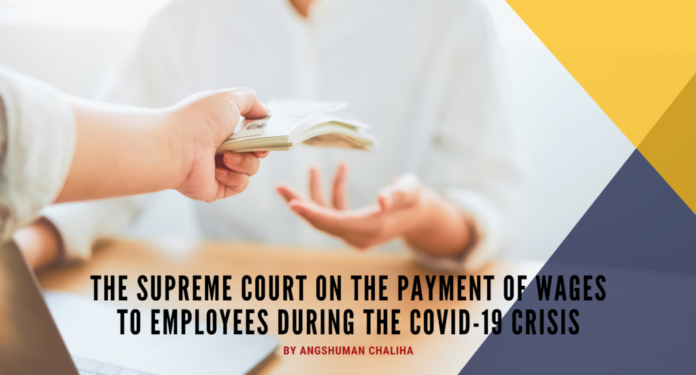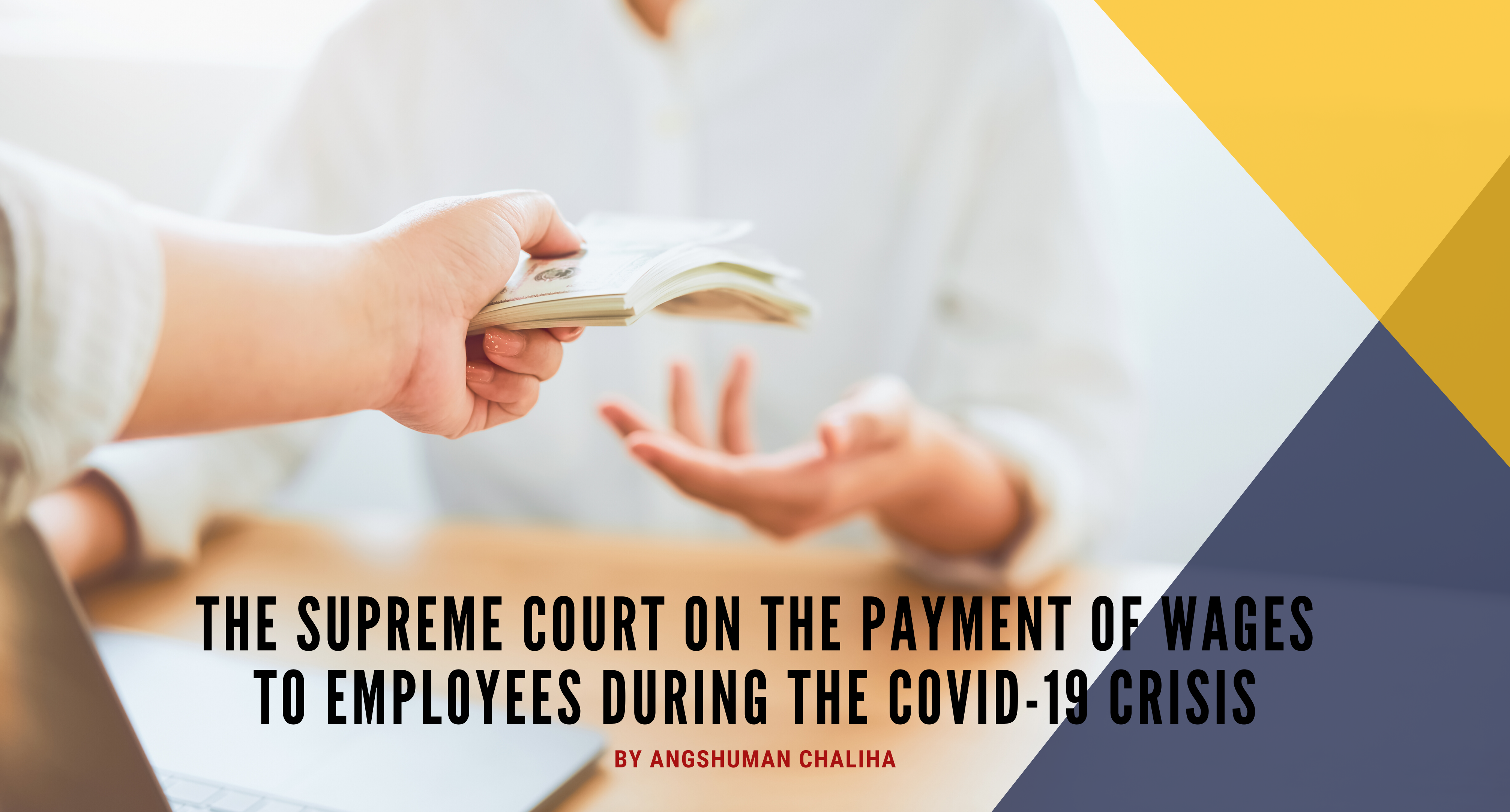
Recently, the Supreme Court of India has heard a number of petitions filed by employers and their associations. This includes the Writ Petition (C) Diary No. 10983 of 2020 filed by Karnataka-based Ficus Pax Pvt. Ltd., which challenged the constitutional validity of two notifications: the first, issued by the Secretary of the Ministry of Labour and Employment on 20 March, 2020 (“20 March Notification”), and the second, issued by the Ministry of Home Affairs (MHA) on 29 March 2020 (“29 March Notification”), in the exercise of powers under Section 10(2)(l) of the Disaster Management Act, 2005. Both notifications compelled employers to pay full wages to employees and workers during the period of lockdown.
The Petitioners have challenged the directions in Clause III of the 29 March Notification and other consequential orders issued by different states, which directs employers not to deduct the wages for the period the establishment remained closed due to lockdown. The Supreme Court has taken a holistic approach in its Order dated 12 June, 2020.
While the Supreme Court has not compelled the employers to implement the directions of the MHA in Clause III of the 29 March Notification, it has called upon the employers to discuss the matter with their employees and workers and/or their unions and representatives, and settle the aspect of wages/salaries for the period of lockdown.
The Government of India has admitted before the Supreme Court, that the MHA by a later order dated 17 May, 2020, revoked its earlier notification to the extent of wages for the lockdown period. The Maharashtra government by its order dated 17 May, 2020, directed that all its earlier orders on this matter shall be aligned with Government of India order and remain in force till 31 May, 2020.
The legality of the 29 March Notification of the Government of India has not been decided, as the Supreme Court will decide the matter on merits on the next date, during the end of July 2020.
The Supreme Court is thus concerned with the 50 days period between 29 March and 17 May, during which the notification was valid – and holds the issue to be resolved for these 50 days.
Until the legality of the 29 March Notification is decided, the Supreme Court has directed the employers to call the employees and workers and/or their unions and representatives to negotiate and settle the aspect of wages only of these 50 days.
The Supreme Court in its Order dated 12 June, 2020, does not insist upon discussing the payment of wages for the period beyond 17 May, 2020. It can thus be implied that employers have committed no illegality if wages from 18 May, 2020 are not paid.
Considering that harmony is essential for peaceful and effective working, employers and employees and workers must negotiate and amicably resolve the issue of employment and wages for these 50 days.
The Supreme Court, being aware that the circumstances would vary from company to company, left this decision to the management and employees and workers and/or their unions and representatives as they are familiar with the workings of the company. If they are not able to settle it among themselves, they could seek the support of the concerned labour authorities.
The Supreme Court in its Order dated 12 June, 2020, is specific that if the management is not able to settle or fails to pay wages for the notified period, they shall not be prosecuted and there shall be no coercive action taken upon the employer.
The Supreme Court has clarified that if the dispute of wages is not settled, it shall be treated as an “Industrial Dispute”, or the labour commissioner shall refer to the Labour Tribunal for adjudication. Had the Supreme Court held the 29 March Notification to be illegal, none of the employers would have paid wages for these 50 days or the notified period.
The Supreme Court has insisted that the parties resolve the dispute themselves without terming it an “Industrial Dispute”, thereby minimising the issue when the petition is heard on merits. There would be no harm in concluding that the Supreme Court is, to a large extent, convinced that the 29 March Notification is inappropriate for the following reasons:
- Legality of 29 March Notification is kept open;
- No coercive action if no wages are paid for the notified period;
- No compulsion to settle the aspect of wages for the notified period. The only compulsion appears to be for negotiations and amicable resolutions;
- Failure to settle does not lead to reference to the Tribunal for adjudication; and
- There are no wages to be paid for the non-notified period as the Supreme Court has confined the aspect strictly to 50 days of notified period.
In the absence of coercive action and no compulsion to pay for 50 days, the management need not succumb to any unwanted pressure. If the terms offered by employees are reasonable, affordable and within the capacity, the management should settle rather than wait for the outcome of the petitions. If the Supreme Court holds that the 29 March Notification is not legal, employees and workers would not be entitled to wages for those 50 days or the notified period.
Some employers who have the capacity to settle on the terms proposed by the employees and workers and can sustain loss of production and may wait for the final verdict of the Supreme Court. If the petitions are allowed, they would justify their refusal to pay the wages. It becomes equally important for employees and workers and/or their unions and representatives to be pragmatic, reasonable and to understand the realities rather than put pressure on their employer.
The situation in Maharashtra is not confined to 50 days. Though the Government of India by its order dated 17 May, 2020, revoked the direction to pay wages as per its earlier 29 March Notification, the Maharashtra Government by an order dated 17 May, 2020, extended the benefits upto 31 May, 2020. Thus, the notified period in Maharashtra is beyond 17 May, 2020.
Disclaimer:
The views expressed in this publication are solely the views of the author and not Universal Legal. This publication is intended for informational purposes only and does not constitute legal advice or a substitute for consultation with a licensed legal professional in a particular case or circumstance.


